- Home
- Gillian Flynn
The Complete Gillian Flynn Page 54
The Complete Gillian Flynn Read online
Page 54
If ifs and buts were candies and nuts we’d all have a very Merry Christmas, I heard my aunt Diane boom in my head. Those words had been the bane of my childhood, a constant reminder that nothing turned out right, not just for me but for anyone, and that’s why someone had invented a saying like that. So we’d all know that we’d never have what we needed.
Because—remember, remember, remember, Baby Day—Ben was home that night. When I got out of bed to go to my mom’s room, I saw his closed door with the light under it. Murmuring from inside. He was there.
“Maybe you could go ask him, make that your first stop, go see Ben.”
Ben in prison. I’d spent the last twenty-odd years refusing to imagine the place. Now I pictured my brother in there, behind the wire, behind the concrete, down a gray slate hall, inside a cell. Did he have photos of the family anywhere? Would he even be allowed such a thing? I realized again I knew nothing about Ben’s life. I didn’t even know what a cell looked like aside from what I’d seen in the movies.
“No, not Ben. Not yet.”
“Is it a money thing? We’d pay you for that.”
“It’s a lot-of-things thing,” I grumbled.
“Okaaaaaaaay. You want to look into Runner then? Or … what?”
We sat silent. Neither of us knew what to do with our hands; we couldn’t keep eye contact. As a child, I was constantly being sent on playdates with other kids—the shrinks insisted I interact with cohorts. That’s what my meeting with Lyle was like: those first loose, horrible ten minutes, when the grown-ups have left, and neither kid knows what the other one wants, so you stand there, near the TV they’ve told you to keep off, fiddling with the antenna.
I picked through the complimentary bowl of peanuts in their shells, brittle and airy as beetle husks. I dropped a few in my beer to get the salt. I poked at them. They bobbed. My whole scheme seemed remarkably childish. Was I really going to go talk to people who might have killed my family? Was I really going to try to solve something? In any way but wishful thinking could I believe Ben was innocent? And if he was innocent, didn’t that make me the biggest bastard in history? I had that overwhelming feeling I get when I’m about to give up on a plan, that big rush of air when I realize that my stroke of genius has flaws, and I don’t have the brains or energy to fix them.
It wasn’t an option to go back to bed and forget the whole thing. I had rent coming up, and I’d need money for food soon. I could go on welfare, but that would mean figuring out how to go on welfare, and I’d probably sooner starve than deal with the paperwork.
“I’ll go talk to Ben,” I mumbled. “I should start there. But I’d need $300.”
I said it thinking I wouldn’t really get it, but Lyle reached into an old nylon wallet, held together with duct tape, and counted out $300. He didn’t look unhappy.
“Where you get all this money from, Lyle?”
He beefed up a bit at that, sat up straighter in his chair. “I’m treasurer of the Kill Club; I have a certain amount of discretionary funds. This is the project I choose to use them for.” Lyle’s tiny ears turned red, like angry embryos.
“You’re embezzling.” I suddenly liked him more.
Ben Day
JANUARY 2, 1985
10:18 A.M.
It was an hour bike ride from the farm to Kinnakee proper. At least an hour, at a good pace when the cold wasn’t turning your lungs metal-red and blood wasn’t dripping down your cheek. Ben planned his work at the school for the times when it was most empty—like, he’d never go there on a Saturday because the wrestling team had the gym on Saturdays. It was just too lame holding a mop when all these blocky, muscled, loud guys were waddling around, spitting chaw on the floor you just cleaned and then looking at you, half guilty, half daring you to say something.
Today was Wednesday, but it was still Christmas break, so the place should be kind of quiet—well, the weight room was always busy, always making that sound like a thumping steel heart. But it was early. Early was always best. He usually went from eight to noon, mopped and straightened and shined like the fucking monkey he was, and got the hell out before anyone saw him. Sometimes Ben felt like a fairy-tale elf who’d creep in and leave everything spotless without anyone noticing. The kids here didn’t give a shit about keeping things clean: They’d toss a carton toward a trash can, the milk drooling all over the floor, and just shrug. They’d spill sloppy-joe meat on their cafeteria seat and just leave it there, hardening, for someone else to deal with. Ben did it, too, just because that’s what everyone did. He’d actually drop a glob of tuna sandwich on the floor and roll his eyes like it wasn’t worth dealing with, when he was the guy who’d be dealing with it in a few days. It was the stupidest thing, he was actually abusing himself.
So it sucked to deal with this shit at any point, and it was even worse to deal with it when other kids were around, trying to avoid seeing him. Today, though, he’d take his chances, go ahead and put in his shift. Diondra was driving into Salina for the morning to shop. The girl had at least twenty pairs of jeans, all of them looking the same to Ben, and she needed more, some special brand. She wore them baggy, rolled the cuffs tight at her ankle with those bulky socks peeking out. He always made sure he complimented the new jeans, and Diondra would then immediately say, but what about the sooooocks? It was a joke, but not really. Diondra wore only Ralph Lauren socks—they cost, like, $20 a pair, a fact that turned Ben’s stomach. She had an entire dresser filled with socks—argyle and polka-dotted and striped, all with the horseman at the top, midswing. Ben had done the math: must be $400 of socks in that drawer, sitting there like a bin of Florida fruits—worth probably half what his mom made in a month. Well, rich people need stuff to buy, and socks are probably as good as anything. Diondra was a strange one, not really preppy—she was too flashy and wild to fit in that crowd—but not entirely in the metal crowd, either, even though she blared Iron Maiden and loved leather and smoked tons of weed. Diondra wasn’t in any clique, she was just the New Girl. Everyone knew her but didn’t at the same time. She’d lived all over, a lot of it in Texas, and her standard line whenever she did anything you might want to frown on, was “That’s how they do it in Texas.” No matter what she did, it was OK, because that’s how they did it in Texas.
Before Diondra, Ben had just floated: he’d been a poor, quiet farm boy, who hung out with other farm kids in an unnoticed corner of the school. They weren’t dorky enough to be actually reviled; they were never picked on. They were the background noise of high school. To him, that was worse than being humiliated. Well, maybe not, there was this guy with big bifocals, a kid Ben knew since kindergarten who’d always been weird. The kid crapped his pants the first week of high school—the stories varied how: one had him dropping bundles of shit out his shorts while he climbed the rope in gym, another had him losing a load in homeroom, there were third and fourth and fifth versions. The main point was, he was forever branded Shitshorts. He kept his head down between classes, those moon-sized glasses aimed at the floor, and still some jock would slap him in the head, Hey Shitshorts! He’d just keep walking, his face in this grim smile, like he was pretending to be in on the joke. So yeah, there were worse things than being unnoticed, but Ben hadn’t liked it, didn’t want to be the same Nice, Quiet Red-headed Kid he’d been since first grade. Dickless and boring.
Big fucking thanks then to Diondra for claiming him, at least in private. She’d actually hit him with her car, that’s how they met. It was summer—orientation for freshmen and new kids. It was a crummy three hours, and after, as he was walking across the school parking lot, she’d plowed into him. Knocked him right up on her hood. She’d gotten out, screaming at him, What the fuck is fucking wrong with you? her breath smelling of wine cooler, the bottles clinking in the footwell of her CRX. When Ben apologized—he apologized to her—and Diondra realized he wasn’t going to get angry at her, she got real sweet, she offered to give him a ride home and instead they drove to the outside of town and parked and d
rank more wine coolers. Diondra said her name was Alexis, but after a little bit she told him she’d lied. It was Diondra. Ben told her she should never lie about a cool name like that and it made her happy and after a little bit longer Diondra said, “You know what, you have a really nice face,” and then a few seconds later, she said, “You wanna scam or what?” and then they were full-on making out, which wasn’t his first time, but was only his second. After an hour, Diondra had to go, but she said he was a great listener, it was really cool how great a listener he was. She didn’t have time to drive him home after all. She dropped him off right back where she’d hit him.
So they started dating. Ben didn’t really know her friends, and he didn’t ever hang out with her at school. Diondra darted in and out of the schoolweek like a hummingbird, sometimes she’d show up, sometimes not. It was enough to see her on the weekends, in their own space where school didn’t matter. Being with her had rubbed off on him, he was just more there.
By the time Ben pedaled into Kinnakee, a cluster of pickup trucks and beat-up sports cars sat in the school parking lot. So, basketball players as well as wrestlers. He knew who drove each car. He thought about ducking out, but Diondra wouldn’t be home for hours, and he didn’t have enough money to linger at the hamburger joint—the owner was red-faced crazy about kids hanging out there without buying something. Plus sitting by yourself at a diner during Christmas break was worse than actually working. Fuck his mom for being such a stress case. Diondra’s mom and dad didn’t care what she did—they were out of town half the time at their place in Texas. Even when Diondra was busted for missing two whole weeks of school last month, her mom had just laughed. When the cat’s away, huh, sweetie? At least try to do some homework.
The back entrance to the school was chained shut, so he had to go in through the locker rooms. The smell of flesh and footspray hit him as he entered. The overhead thunk of the basketball court and clank of the weight room reassured him that the locker room, at least, would be empty. Outside in the hallway, he heard a single long yell—Coooooper! Hold uppp!—echo against the marble floor like a battle cry. Tennis shoes slapped down the hall, a metal door banged open, and then everything was relatively quiet. Just gym and weight-room noise: thunk-thunk, clank, thunk.
The school’s athletes had this trust thing, a sign of teamwork, that they never put locks on their lockers. Instead they all tied thick shoestrings through the loops where a lock would go. At least twelve white strings hung on the lockers and Ben wavered as usual about looking inside one. What the hell did these guys need anyway? If you had school lockers for books, what would go in these gym bins? Were there deodorants or lotions, some kind of underclothes that he was missing? Did they all wear the same kind of jockstrap? Thunk-thunk, clank, thunk. One shoelace hung limply, unknotted, just a quick yank and the locker would open. Before he could talk himself out of it, he pulled off the lace and gently, quietly lifted the metal latch. Inside the locker was nothing of interest: some gym shorts crumpled at the bottom, a rolled-up sports magazine, a gym bag hanging loosely from a hook. The bag looked like it contained a few objects, so Ben leaned in and unzipped it.
“Hey!”
He turned around, the bag swaying wildly on the hook and falling to the bottom of the locker. Mr. Gruger, the wrestling coach, was standing with a newspaper in his hand, his rough, splotchy face twisted up.
“What the hell do you think you’re doing in that locker?”
“I, uh, it was open.”
“What?”
“It was, I saw it was open,” Ben said. He shut it as quietly as he could. Please fuckfuckfuck just not let any of the team come back in, Ben thought. He could picture all the angry faces aimed at him, the nicknames to come.
“It was open? Why were you in it?” Gruger let the question hang there, didn’t move, didn’t give any clue what he was going to do, what level of trouble this was. Ben tried just staring at the floor, waiting to be chastened.
“I said, why were you in that locker?” Gruger smacked the newspaper against his fat hand.
“I don’t know.”
The old man just kept standing there, Ben thinking all the while, just yell and get it done with.
“Were you going to take something?”
“No.”
“Then why were you in it?”
“I was just …” Ben trailed off again. “I thought I saw something.”
“You thought you saw something? What?”
Ben’s mind flashed on things forbidden: pets, drugs, titty magazines. He pictured firecrackers and he thought for a second he’d say the locker was on fire, be a hero.
“Uh, matches.”
“You thought you saw matches?” The blood in Gruger’s face had moved from his cheeks straight up to the flesh beneath his fuzzy crewcut.
“I wanted a cigarette.”
“You’re the janitor boy, right? Something Day?”
Gruger made the name sound silly, girlish. The coach’s eyes examined the cut on Ben’s forehead, then marched pointedly up to his hair.
“You dyed your hair.”
Ben stood under his thatch of black and felt himself being categorized and discarded, sectioned off into a group of losers, druggies, wimps, fags. He was sure he heard that word snarl into the coach’s mind—Gruger’s upper lip twitched.
“Get out of here. Go clean somewhere else. Don’t come back in here til we’re gone. You are not welcome here. You understand?”
Ben nodded.
“Why don’t you say it out loud, just so we’re clear.”
“I’m not welcome here,” Ben mumbled.
“Now go.” He said it like Ben was a boy, a five-year-old being sent back to his mother. Ben went.
Up the stairwell to the janitor’s dank closet, a droplet of sweat dripping down his back. Ben wasn’t breathing. He forgot to breathe when he was this angry. He got out the industrial-sized bucket and rattled it into the sink, ran hot water into it, poured in the piss-colored cleaning mixture, ammonia fumes burning his eyes. Then heaved it back into the wheelframe. He’d filled the bucket too heavy, it tipped as he tried to get it over the edge of the sink, sloshing a half-gallon of water down his front. His crotch and leg were nice and soaked. Looked like he wet himself, Janitor Boy Day. The jeans stuck to his thighs, turned rigid. He’d have three hours of shitty grunt work with a wet crotch and jeans like cardboard.
“Fuck you, fucker,” he muttered quietly. He kicked the wall with a workboot, spraying plaster, and smashed the wall with a hand. “Fuuuuuck!” he bellowed, his voice going high at the end. He waited in the closet like a coward, worrying that Gruger would track the scream and decide to screw with him some more.
Nothing happened. No one was interested enough to see what was going on in the janitorial closet.
HE WAS SUPPOSED to have cleaned a week earlier, but Diondra had whined it was officially Christmas break, leave it. So the cafeteria trash was filled with old soda cans dripping syrup, sandwich wrappers covered in chicken salad, and moldy helpings of 1984’s final lunch special, a hamburger casserole with sweet tomato sauce. All of it rotten. He got a little bit of everything on his sweater and jeans, so in addition to ammonia and B.O. he smelled like old food. He couldn’t go to Diondra’s like this, he was an idiot to have planned it like this in the first place. He’d have to bike home, deal with his mom—that was a thirty-minute lecture right there—shower, and bike back over to her place. If his mom didn’t ground him. Screw it, he’d still leave. It was his body, his hair. His fucked-up faggoty black hair.
He mopped the floors, then bagged the trash in all the teachers’ rooms—his favorite chore because it sounded big but amounted to gathering bunches of crumpled paper, light as leaves. His final duty was to mop down the hall that connected the high school to the grade school (which had its own embarrassed student-janitor). The hallway was papered with loud notices about football and track and drama club on the high school side, and then slowly disintegrated into children’s t
erritory, the walls covered with letters of the alphabet and book reports on George Washington. Bright-blue doors marked the grade-school entrance, but they were ceremonial; they didn’t even have locks. He mopped his way from Highschooland to Kiddieville and dropped the mop into the bucket, kicked the whole thing away from him. The bucket rolled smoothly across the concrete floor and hit the wall with a modest splash.
From kindergarten through eighth grade, he’d gone to Kinnakee Grade School; he had more connection with that side of the building than the high school side where he stood now, pieces of its refuse stuck to him.
He thought about opening the door, wandering through the silence on the other side, and then that’s what he was doing. Just saying hi to the old place. Ben heard the door shut behind him, and felt more relaxed. The walls here were lemon yellow, with more decorations outside each classroom. Kinnakee was small enough that each grade was just one class. The high school was different, twice as big because other towns funneled their teens in. But the grade school was always nice and cozy. On the wall, he spotted a smiley felt sunshine, Michelle D., Age 10, written along one side. And here was a drawing of a cat in a vest with buckle shoes—or maybe they were high heels—anyway it was smiling and handing a present to a mouse who was holding a birthday cake. Libby D., Grade 1. He looked but saw nothing from Debby, he wasn’t sure the kid could draw, come to think of it. She tried to help his mom bake cookies one time, breathing loudly and botching the recipe, then eating more of the dough than she cooked. Debby was not the kind of kid who had anything put up on the wall.
All along the hallway were rows of yellow bins where the students were allowed to keep personal items, each kid’s name written on masking tape on their bin. He looked in Libby’s and found a peppermint candy, partially sucked, and a paper clip. Debby’s had a brown lunchsack that stank of baloney; Michelle’s a pack of dried-up markers. He looked in a few others just for kicks, and realized how much more stuff they had. Sixty-four Crayola crayon box sets, battery-operated toy cars and dolls, thick reams of construction paper, key chains and sticker books and bags of candy. Sad. That’s what you get when you have more kids than you can take care of, he thought. It was what Diondra always said when he mentioned tight times at home: Well, your mom shouldn’t have had so many babies then. Diondra was an only child.

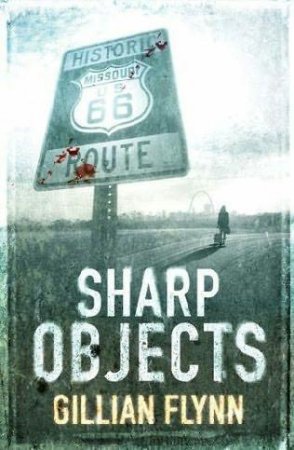 Sharp Objects
Sharp Objects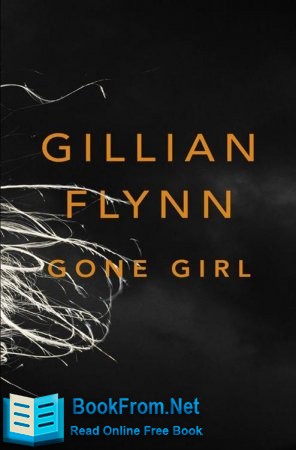 Gone Girl
Gone Girl Dark Places
Dark Places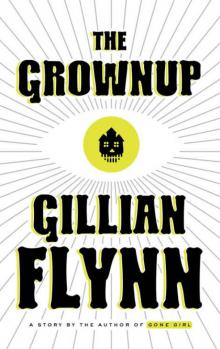 The Grownup
The Grownup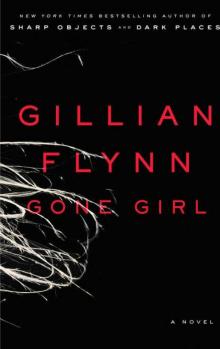 Gone Girl: A Novel
Gone Girl: A Novel The Complete Gillian Flynn
The Complete Gillian Flynn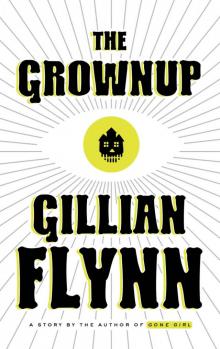 The Grownup: A Story by the Author of Gone Girl (Kindle Single)
The Grownup: A Story by the Author of Gone Girl (Kindle Single)